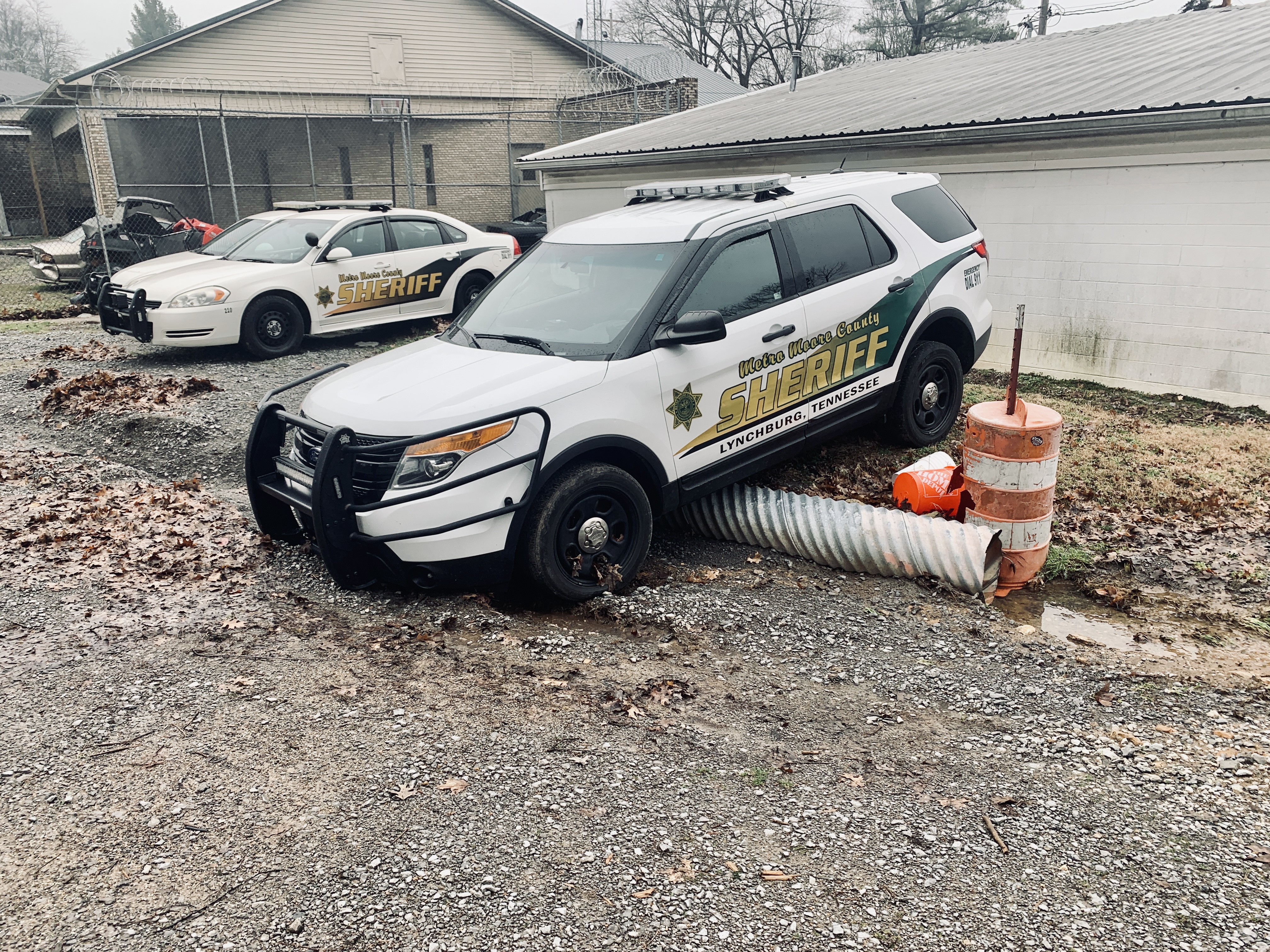LYNCHBURG, Tenn. — On February 23, Metro Moore County received as much as five inches of rain in just a couple of hours and much of it flowed into the retention pond behind the Moore County Jail located just off Elm Street. It’s a problem – one that’s already damaging the Jail, Metro Sheriff Department Annex, local roads, and homes along Main Street.
“All the water from the Lynchburg Cemetery and Chapman Acres all flows this way. It flows into the retention pond behind the building and then overflows from there,” Sheriff Tyler Hatfield explained to the Metro Council during their March meeting on Monday. “Water, after heavy rain, flows with such force that it washes out about 10-12 inches of soil. It washed out so much soil underneath a parked patrol car back there that the car sat on its frame instead of the tires after the water receded.”
The cause according to Metro Mayor Bonnie Lewis is a “huge storm drain problem” that’s been getting increasingly worse over the past several years. Mayor Lewis says Metro records don’t give the construction dates of the original storm drains but based on the size of the pipes that were used, it was several years ago.
On Monday the Metro Council voted to authorize Mayor Lewis to submit an application for a Community Development Block Grant (CDBG) to fund a portion of what’s been labeled the Metro Storm Drain Project. That motion passed unanimously with all members present at the meeting.
According to the Metro Mayor’s office, the total estimated cost of the project is $828,947. The CDB grant will cover $630,000 of the project. The required local contribution of $198,947 (or 24 percent of the total project cost) will be covered with American Rescue Plan Funds (ARPF) allocated to Metro Moore County. Like all CDB grants, there is no pay back obligation.
The CDBG money will fund the mapping, planning, and design of the project and some costs of the first phase, which will address collapsed or damaged storm drains down Elm Street in front of the Moore County Jail. The CDBG money will also cover engineering for the areas around the historic Lynchburg Square, which is the next area of immediate concern according to Mayor Lewis.

Federal dollars administered through the state
The federal government funds Community Development Block Grants (CDBG) through the Office of Housing and Urban Development (HUD). In Tennessee, the Department of Economic & Community Development administers the grant program. Our state typically receives around $25 million per year for CDBG projects and 80-85 percent of those dollars go to water and sewer projects like the Metro Moore Storm Drain Project.
All CDBG projects must align with one of three federal objectives to qualify: 1) must primarily benefit low and moderate income persons, 2) must eliminate slums and blight, and/or 3) must address an imminent health and safety concern. Additionally, each project must be environmentally reviewed and competitively procured through the bid process.
Community surveys necessary to move forward with application
Thanks in part to higher than the national average salaries paid at the Jack Daniel Distillery, tiny Moore County ranks seventh in the state of Tennessee in highest per capita income, according to the U.S. Census Bureau. All the other Tennessee counties in the Top 10 boast more than three times our population.
It’s great for local citizens but complicates matters when Metro officials apply for state or federal grants with a “low income” qualifier. In order to complete the current application for the CDBG money, Metro must successfully survey a percentage of Moore County citizens about their total annual household income, an idea that received pushback the last time Metro attempted to apply for free federal money to solve a local problem. In 2021, that money would have been used to fund water pressure issues in the south end of Moore County. {To read our complete coverage of that pushback, click here.} Several members of the community showed up at the January 2021 Metro Council meeting to voice their objections about the “invasion of their privacy.”
During that meeting, Mayor Bonnie Lewis explained that CDBG officials can not pull the required information from the most recent Moore County Census data. Instead, Metro officials must independently gather survey information and submit it along with their application. They need a total of 75 completed surveys to move forward.
“The great news is that once we reach that threshold, our survey requirement for applications will be covered for the next three years,” Mayor Lewis explained during Monday’s meeting.
The deadline for the 2022 Community Development Block Grant Target Area Survey will be Friday, April 11. The deadline to apply for the CDBG grant will be April 13. Blank surveys are currently available at the Metro Mayor’s office, Courthouse offices, the Metro Utility Department, and the Moore County Jail. •
{The Lynchburg Times is the only locally owned newspaper in Lynchburg and also the only woman-owned newspaper in Tennessee. We cover Metro Moore County government, Jack Daniel’s Distillery, Nearest Green Distillery, Tims Ford State Park, Motlow State Community College, Moore County High School, Moore County Middle School, Lynchburg Elementary, Raider Sports, plus regional and state news.}
